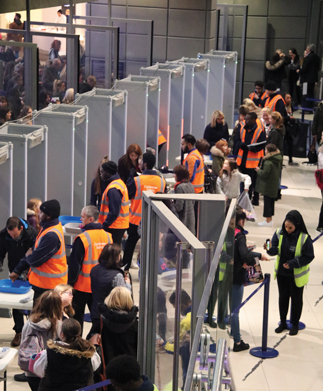The search regime has long been a staple of indoor and outdoor event venues, music or sporting, and has become only more important after the terror attacks of recent years that made concert or sports events a target, such as the Stade de France in Paris in November 2015 and the Manchester Arena in May 2017. To take a most recent example of the various big-city outdoor ticketed events to celebrate the new year; in New York, the NYPD required people seeing in 2018 in Times Square to go through a screening process, and then a second one. Here we continue our feature on security at The O2 (pictured), as guests of Richard Latham, head of security, who talks us through how the venue makes its searching at the same time effective, hard for terrorists or others seeking to do harm to undermine, and yet friendly towards the genuine customer and as smooth as reasonably possible.
As the personal safety awareness trainer Steve Collins of PS5 pointed out in the December 2017 issue, it’s one thing to have a search regime, but how effective it is – or whether it is at all – depends on what those carrying out the search are looking for.
Richard recalled that on his arrival, The O2 was indeed doing standard searches of people entering the Arena – ticket checks, removing food and drink and quick bag checks. Richard brought in ‘search arches’. His choice of words is deliberate. He does not say whether the search regime is to catch ‘piranha fish or drugs’: “They are search arches.” Nor is Professional Security any the wiser from what it could see. When we went through, we told the search operators that a camera and lens were inside the bag, thinking to explain something that might bother them. The staff didn’t respond either way – and that’s not to suggest that the operators were poor in their customer service; they were not.
Richard, suffice to say, is pleased that everyone going into the Arena is searched and is ‘clean’: “And that’s fantastic.” Again, security is in tune with the wider operations at The O2; and it’s only fair to say that other similar venues take care to let concert-goers know, through social media and on the tickets, that such checks will happen at the door. So customers are urged to leave enough time, just as they would to go to the airport. Likewise, in Edinburgh, London and New York alike, organisers of the new year events urged visitors beforehand to arrive in good time to avoid annoyance during queues before searching; Edinburgh in fact offered a choice of queues at the entrance; for those with bags, and those without. Not that that’s novel – as in security as in many things, there’s nothing new under the sun; the British Museum has a pair of line queues, one for museum members and one for the general public. But to return to The O2.
Partnership
Richard and other UK end users of security are one side of a triangle – the others being police and Government; and defence and security sector product companies such as Qinetiq – that are trialing new products, ‘that will help us to protect the public and allow them to go about their business’. Again, all sides stand to gain there: security technology may filter out the abnormal from the law-abiding and harmless, so that those customer-friendly staff can be directed to someone suspicious. And the companies develop product that the UK can export. Security, then, at The O2 as elsewhere is forever developing; partly because there are always lessons to be learned from the terrorists and other criminals; partly because it’s good to keep the ‘hostiles’ guessing; or as Richard puts it, to make the security at The O2 ‘unfathomable’; no matter how many times you go there, as a hostile, ‘you aren’t going to work out what the security is’.
More words and pictures in the February 2018 print issue of Professional Security magazine.
For more on The O2’s security, visit The O2 website.
For more on the New York Police Department’s searches on New Year’s Eve in downtown New York, see the NYPD website.









